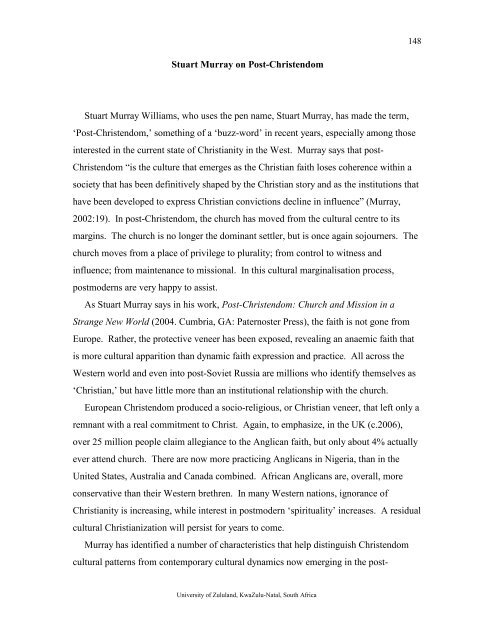Haase_UZ_x007E_DTh (2).pdf - South African Theological Seminary
Haase_UZ_x007E_DTh (2).pdf - South African Theological Seminary
Haase_UZ_x007E_DTh (2).pdf - South African Theological Seminary
Create successful ePaper yourself
Turn your PDF publications into a flip-book with our unique Google optimized e-Paper software.
148<br />
Stuart Murray on Post-Christendom<br />
Stuart Murray Williams, who uses the pen name, Stuart Murray, has made the term,<br />
‘Post-Christendom,’ something of a ‘buzz-word’ in recent years, especially among those<br />
interested in the current state of Christianity in the West. Murray says that post-<br />
Christendom “is the culture that emerges as the Christian faith loses coherence within a<br />
society that has been definitively shaped by the Christian story and as the institutions that<br />
have been developed to express Christian convictions decline in influence” (Murray,<br />
2002:19). In post-Christendom, the church has moved from the cultural centre to its<br />
margins. The church is no longer the dominant settler, but is once again sojourners. The<br />
church moves from a place of privilege to plurality; from control to witness and<br />
influence; from maintenance to missional. In this cultural marginalisation process,<br />
postmoderns are very happy to assist.<br />
As Stuart Murray says in his work, Post-Christendom: Church and Mission in a<br />
Strange New World (2004. Cumbria, GA: Paternoster Press), the faith is not gone from<br />
Europe. Rather, the protective veneer has been exposed, revealing an anaemic faith that<br />
is more cultural apparition than dynamic faith expression and practice. All across the<br />
Western world and even into post-Soviet Russia are millions who identify themselves as<br />
‘Christian,’ but have little more than an institutional relationship with the church.<br />
European Christendom produced a socio-religious, or Christian veneer, that left only a<br />
remnant with a real commitment to Christ. Again, to emphasize, in the UK (c.2006),<br />
over 25 million people claim allegiance to the Anglican faith, but only about 4% actually<br />
ever attend church. There are now more practicing Anglicans in Nigeria, than in the<br />
United States, Australia and Canada combined. <strong>African</strong> Anglicans are, overall, more<br />
conservative than their Western brethren. In many Western nations, ignorance of<br />
Christianity is increasing, while interest in postmodern ‘spirituality’ increases. A residual<br />
cultural Christianization will persist for years to come.<br />
Murray has identified a number of characteristics that help distinguish Christendom<br />
cultural patterns from contemporary cultural dynamics now emerging in the post-<br />
University of Zululand, KwaZulu-Natal, <strong>South</strong> Africa

















